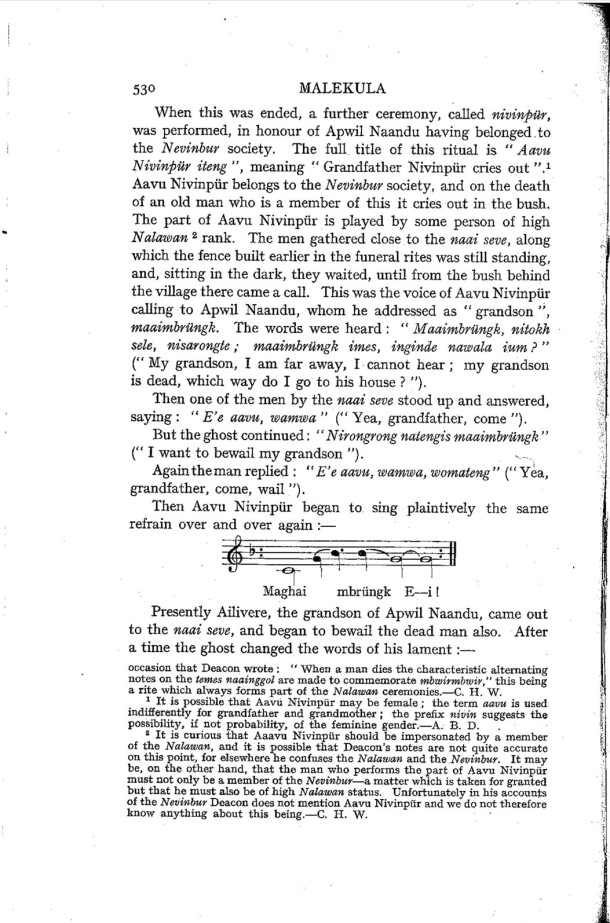|
|  [Note: this transcription was produced by an automatic OCR engine]
530 MALEKULA
When this was ended, a further ceremony, called nivi'n¢a1,
was performed, in honour of Apwil Naandu having belongedto
the Nevinbur society. The full title of this ritual is “Aavu
Nivinjiiér itzng ", meaning “ Grandfather Nivinpiir cries out ".1
Aavu Nivinpiir belongs to the Neuinbw society, and on the death
of an old man who is a member of this it cries out in the bush.
The part of Aavu Nivinpiir is played by some person of high
Nalawan 2 rank. The men gathered close to the naai save, along
which the fence built earlier in the funeral rites was still standing,
and, sitting in the dark, they waited, until from the bush behind
the village there came a call. This was the voice of Aavu Nivinpiir
calling to Apwil Naandu, whom he addressed as “ grandson ‘i,
maaimbrimgk. The words were heard: “ Maaimbmngk, nitokh
sale, misanmgtz ,' nmaimbvï¬Ångk imes, inginde nawala ium P â€ù
(“ My grandson, I am far away, I cannot hear; my grandson
is dead, which way do I go to his house P ").
Then one of the men by the naai seve stood up and answered,
saying: “ E32 azwu, wamwa " (“ Yea, grandfather, come ").
But the ghost continued : “Nirrmgrong natengis maaimbrtingk â€ù
(" I want to bewail my grandson "). -_
Againtheman replied : "E'e amm, wamwa, womatmgâ€ù (“ Yea,
grandfather, come, wail ").
Then Aavu Nivinpiir began to sing plaintively the same
refrain over and over again :—
'
~e[— M
Maghai mbriingk E—i I
Presently Ailivere, the grandson of Apwil Naandu, came out
to the naai save, and began to bewail the dead man also. After
a time the ghost changed the words of his lament :—
occasion that Deacon wrote; “ When a man dies the characteristic alternating
notes on the tame: naainggal are made to commemorate mb1m'rmbw1'1," this being
a. rite whieh always forms part of the Nalawan oeremcnies.—C. H. W.
1 It is possible that Aavu Nivinpiir may be female; the term mu is used
indiï¬Åerently for grandfather and grandmother; the preï¬Åx niuin suggests the
possibility, if not probability, of the feminine geuder.—A. B. D, _
' It is curious that Aaavu Nivingilr should be impersonated by a, member
of the Nalaaum, and it is possible at Deacon's notes are not quite accurate
on this point, for elsewhere he confuses the Nnlawnn and the N¢w"nbu'/. It may
be, on the other hand, that the man who performs the part of Aavu Nivinptir
must not only be 21. member of the Novinbur—a, matter which is taken for granted
but that he must also be of high Nnlawan status. Unfortunately in his accounts
of the Nevinbur Deacon does not mention Aavu Nivinpï¬År and we do not thereiore
know anything about this being,—C. H4 W. ‘
, W
"5
A
it
1
l
|